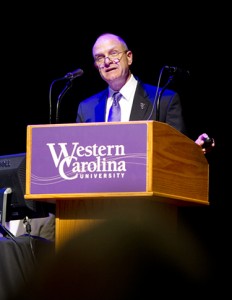
In his remarks, Chancellor David O. Belcher repeatedly expressed appreciation to university faculty and staff for helping attract and retain students. Photo courtesy of WCU Office of Public Relations.
Western Carolina University has identified four areas of emphasis for the 2015-16 academic year that are central to the institution’s future success: increasing diversity on campus, preparing for a comprehensive fundraising campaign to boost scholarship dollars, enhancing the total student experience, and supporting faculty and staff.
Those four areas, as Chancellor David O. Belcher said during the Opening Assembly on Aug. 12, will become the focus of a series of roundtable discussions to begin later this fall at which campus leaders will provide additional information and seek input, ideas and possible solutions from the university community.
“This is the time for strategic thinking to ensure that Western Carolina University doesn’t just survive, but thrives in our emerging environment,” Belcher said. “I don’t have all the answers. Frankly, I’m glad that I don’t. I find that the best solutions and trajectories are those that benefit from give-and-take, debate and brainstorming. We need to all be in this together.”
Belcher tag-teamed with Provost Alison Morrison-Shetlar to discuss the four areas of focus for the year ahead. On the topic of diversity, Morrison-Shetlar reminded those gathered in the John W. Bardo Fine and Performing Arts Center that the university is in the process of seeking its first chief diversity officer, a new position at WCU, as part of an ongoing emphasis on diversity.
“A study carried out by talking to groups of faculty and staff all across campus about the role of a chief diversity officer revealed that we have a multitude of diversity initiatives occurring on the campus, and what we need is a champion for these initiatives and a liaison with our local community,” she said. “It will take all of us to ensure success.”
Diversity does not just refer to race or gender, Morrison-Shetlar said. “We value diversity in thought and opinion, our life experiences, sexual orientation, race, ethnicity, socio-economic differences, geographic location and cultural differences, to name just a few for our consideration,” she said.
Moving to the issue of total student experience, Morrison-Shetlar said that students’ experience with WCU begins before they enroll as they review the university’s website and admissions materials, and that it continues after they graduate and enter the job market as alumni.
“We know that each student comes with individual passions but may be unsure of where their passions lie. The fastest growing major of choice for these students coming in the door is undeclared,” she said. “It takes all of us to help students find their academic passion, and that includes our advisers, faculty, staff and the community.”
Many nonacademic programs enhance the student experience, she said, ranging from residential life and student leadership opportunities to athletics, Greek-letter organizations and intramural sports.
Tackling topic No. 3 – increasing scholarships – Belcher told the audience that last year only 9 percent of WCU students attended school with support from privately funded scholarships while the year before students took out nearly $60 million in loans for just a single year of education.
“We take great pride at Western Carolina University in the fact that we are one of the most affordable institutions of higher education in the United States, but that clearly means little to so many of our students, particularly as families continue to struggle to recover from the effects of the Great Recession,” he said. “We must take on this issue of scholarships if we want to continue to be true to our historic commitment of providing access to university for those students who are prepared for the rigors of a higher education experience.”
That is why the university is gearing up for a comprehensive campaign to raise money for endowed scholarships, he said.
The fourth topic of focus is to ensure that the university invests in its people, Belcher said. “We can enhance diversity on our campus, we can build a strong portfolio of endowed scholarships, but if we don’t take care of the people who do what I call ‘the real work’ of the university – its faculty and staff – there is no way Western Carolina can thrive, particularly in the face of challenge,” he said. “A great, satisfied workforce is a requirement to provide a great experience for our students.”
Belcher outlined several positive steps that have occurred recently in support of faculty and staff, including bringing all employees up to a minimum of 75 percent of the salary labor market; creating a salary floor of $25,000; ensuring that all university employees received salary increases last year; building transparency into business operations through the creation of the Chancellor’s Leadership Council and Budget Advisory Council; implementing a Leadership Academy for faculty and staff; and expanding professional development opportunities.
“We’ve made some progress in supporting our people, but what else can and should we do to really move the needle on this front?” Belcher asked. “What work-life issues are faculty and staff most concerned about, and what can Western Carolina do to address them within the context of our tight budgets?”
The answers to those questions and others surrounding the four areas of interest may be found in the upcoming roundtable discussions to be held in the year ahead, he said.
Story from WCU Office of Public Relations.


